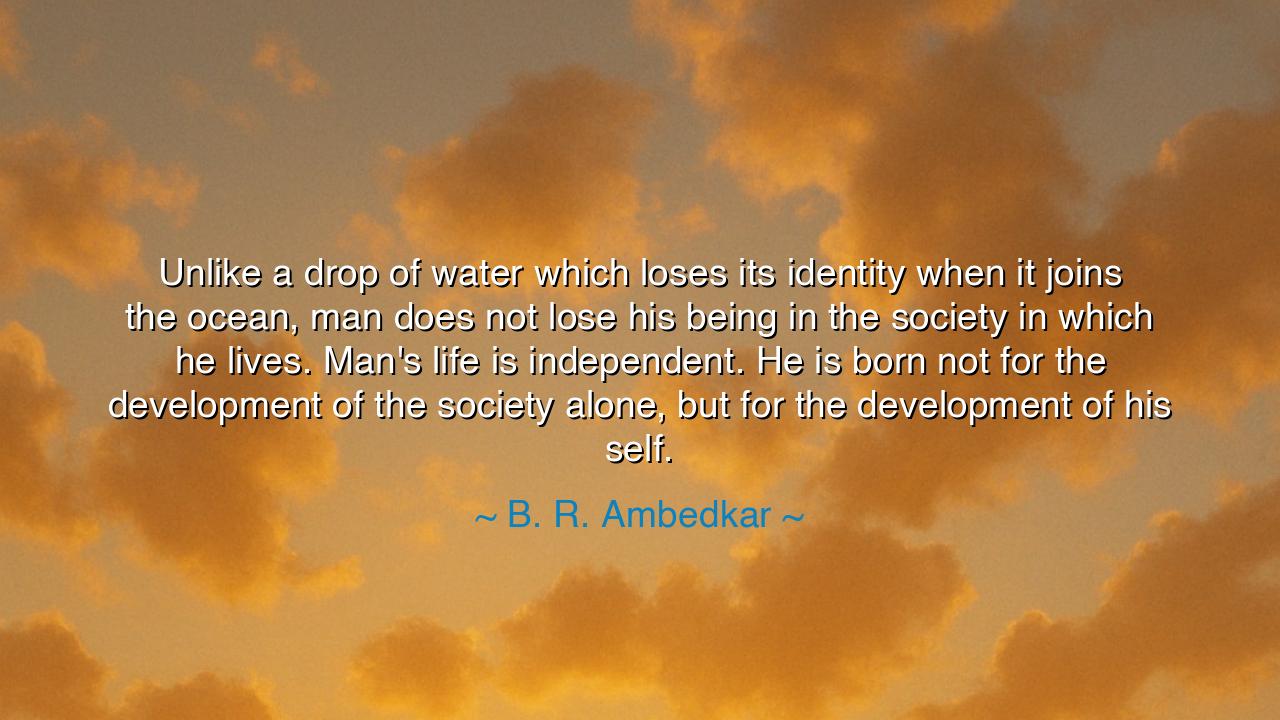
Unlike a drop of water which loses its identity when it joins the
Unlike a drop of water which loses its identity when it joins the ocean, man does not lose his being in the society in which he lives. Man's life is independent. He is born not for the development of the society alone, but for the development of his self.






In the tapestry of human existence, where individuals are often swept along by the currents of society, there arises a profound truth articulated by B. R. Ambedkar: “Unlike a drop of water which loses its identity when it joins the ocean, man does not lose his being in the society in which he lives. Man's life is independent. He is born not for the development of the society alone, but for the development of his self.” These words speak to the very core of what it means to be human. We are not mere products of the society we are born into, nor are we defined solely by our role in it. Instead, Ambedkar calls us to understand that while we are part of a greater whole, our true purpose lies in the development and nurturing of our individual self—a truth as ancient as the world itself.
Consider the wisdom of the great philosophers of old, such as Socrates, who spoke of the self as the foundation of all knowledge and wisdom. Socrates taught that the soul must first be examined, that an individual must come to understand their own being before they can contribute to society in any meaningful way. He argued that a person is not defined by their role in the polis alone, but by their ability to cultivate their inner wisdom. In this, Socrates recognized that true greatness does not come from mere conformity to social expectations, but from the cultivation of the self and the pursuit of personal excellence.
Ambedkar echoes this sentiment in his powerful statement, reminding us that society may shape our circumstances, but it does not define our identity. The journey of self-realization is an individual one, a path where we must seek our own purpose, separate from the roles imposed upon us by family, culture, or nation. This is not to say that we must reject society or its influences, but rather that we must stand as independent individuals within it, with the strength to forge our own destiny. Society, while a powerful force, cannot claim ownership of our souls. Our lives are not to be subjugated to its whims; rather, we must live in a way that honors both our own inner truth and the common good.
In the story of Mahatma Gandhi, we see a man who understood this balance between individuality and society. Gandhi was born into a society with rigid structures, where caste, class, and tradition governed the lives of millions. Yet, he did not allow these societal forces to define him. Instead, he sought to understand himself deeply, to align his life with his own moral compass, and then to use that self-awareness to challenge and transform the society around him. Gandhi’s success was not simply in the political change he brought about, but in his ability to maintain his independence within the collective struggle. He did not lose himself to the ocean of society; rather, he remained true to his principles and encouraged others to do the same.
The lesson Ambedkar imparts is not one of selfishness, but of self-realization. Just as Leonardo da Vinci sought to develop his mind, his craft, and his soul, so too must we strive to cultivate our own being. Da Vinci was not merely a product of the Renaissance, but a man who, through his relentless pursuit of knowledge and creativity, shaped the world in ways that transcended his time. His genius was not born from his society, but from his own individual vision, a vision that could only flourish because he remained committed to his self-development.
The struggle between the individual and society is ancient and ongoing. Ralph Waldo Emerson, a voice of American individualism, proclaimed that society often stifles the creativity and uniqueness of the individual. Yet, it is only through self-discovery that we can contribute authentically to the world. Just as Ambedkar understood, our self-development is the first step towards making a meaningful contribution to society. When we grow in self-awareness and live in accordance with our own values, we bring our best selves to the world, and in doing so, we elevate the collective.
The lesson we take from Ambedkar’s words is this: personal growth is not a luxury or a selfish pursuit, but the foundation of all true progress. If we wish to create a world that is just, compassionate, and inclusive, we must first develop the courage to stand as individuals, to cultivate our own being, and to live in alignment with our highest ideals. Only then can we contribute meaningfully to the community, not as mere cogs in a machine, but as powerful forces of change.
Let us take action: In our own lives, we must strive to nurture and develop our individual selves. Take time to understand your strengths, values, and passions, and let them guide your actions. Resist the pull of conformity that seeks to stifle your uniqueness, and instead, embrace the responsibility of self-realization. By cultivating your own being, you will find not only personal fulfillment but the power to contribute authentically to the world. In this journey, you will not only honor yourself, but you will also honor the society that allows you the freedom to grow and flourish.






AAdministratorAdministrator
Welcome, honored guests. Please leave a comment, we will respond soon